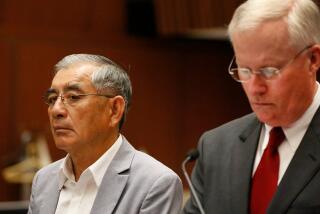FPPC Probe Focuses on 3 in Lincoln Savings Case
- Share via
SACRAMENTO — The state’s Fair Political Practices Commission has opened an investigation into whether two appointees of Gov. George Deukmejian--including Corporations Commissioner Christine W. Bender--violated conflict-of-interest laws in connection with the troubled Lincoln Savings & Loan, it was learned Wednesday.
In addition, the commission is investigating whether Deukmejian’s top political fund raiser, Los Angeles attorney Karl M. Samuelian, violated the law by failing to register as a lobbyist when he contacted Bender and other state officials on behalf of Charles H. Keating Jr., chairman of Lincoln’s parent company, sources said.
The parent firm, American Continental Corp., early last year secured state approval for the issuance of more than $200 million in high-risk bonds.
“We are looking into alleged violations of the Political Reform Act in connection with Lincoln,” said FPPC spokeswoman Sandra Michioku. She declined to elaborate.
It was learned, however, that the allegations before the FPPC grew out of a legislative hearing last week in which Samuelian, Bender and her predecessor as corporations commissioner, attorney Franklin Tom, explained their roles in the Lincoln controversy.
Both Tom and Bender worked for Samuelian’s law firm before their appointment by Deukmejian to their public posts. In February, 1987, Tom resigned as commissioner and returned to the law firm. He was succeeded by Bender, his deputy.
Within weeks of his departure, Tom contacted his former agency to request that files for Lincoln’s parent company, American Continental Corp. of Phoenix, be moved from San Francisco to Los Angeles and that matters before the commissioner involving the firm be expedited.
A year later, Tom and Samuelian met with Bender and her assistants to seek approval for American Continental to continue selling more than $200 million in high-risk bonds to investors, most of them Southern California retirees. Bender approved the request to sell the debentures. More than 22,000 investors bought the bonds, which became worthless with the firm’s bankruptcy in April.
Public records filed by Bender state that she received more than $515 in gifts from Samuelian’s law firm in the year preceding her decision, including a $350 “luncheon in my honor” in May, 1987; a $15 lunch in June, 1987; and a $150 dinner for herself and her husband in June.
State law says that no state administrative official shall participate in a governmental decision “in which he knows or has reason to know he has a financial interest.” The law further defines financial interest as any source of income, including gifts, totaling $250 or more 12 months prior to the decision being made.
It could not be determined late Wednesday whether the gifts are part of the FPPC investigation.
Bender could not be reached for comment late Wednesday, but in an earlier interview she said that she did not agree with the notion that she should sever all her ties with her former law firm.
“The idea that we would never again speak to people we’ve known before we’ve become public officials isn’t realistic,” Bender said.
Two Contacts
During last week’s legislative hearing, ex-commissioner Tom conceded that he contacted his former agency twice to discuss American Continental Corp. matters just weeks after he left to go back to work for Samuelian’s firm. But he said that those contacts were “ministerial”--and not violations of rules that prohibit a commissioner from representing firms before his former agency for 12 months.
Also during the hearing, attorney Samuelian denied reports that he “lobbied” Bender and her department to give approval for the bonds in March, 1988--an activity covered by the political reform act and requiring public disclosure of the contacts.
Samuelian, who said he was hired as an attorney by Keating in 1985, described his discussions with Bender and her subordinates as meetings to “represent a client as a lawyer.”
The issue before the FPPC, however, is whether Samuelian’s contacts were within the state’s definition of lobbying, The Times has learned.
Robert S. Draper, attorney for Samuelian and Tom, said late Wednesday that he was unaware of the FPPC investigation but said that his clients did not violate state rules.
Staff writer Paul Jacobs contributed to this story.
More to Read
Get the L.A. Times Politics newsletter
Deeply reported insights into legislation, politics and policy from Sacramento, Washington and beyond. In your inbox twice per week.
You may occasionally receive promotional content from the Los Angeles Times.










